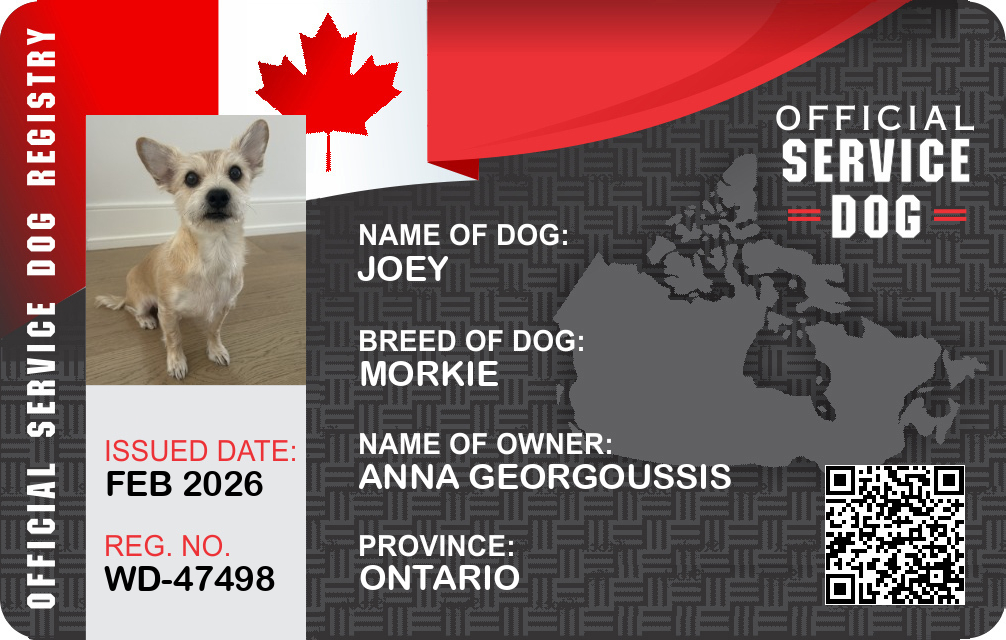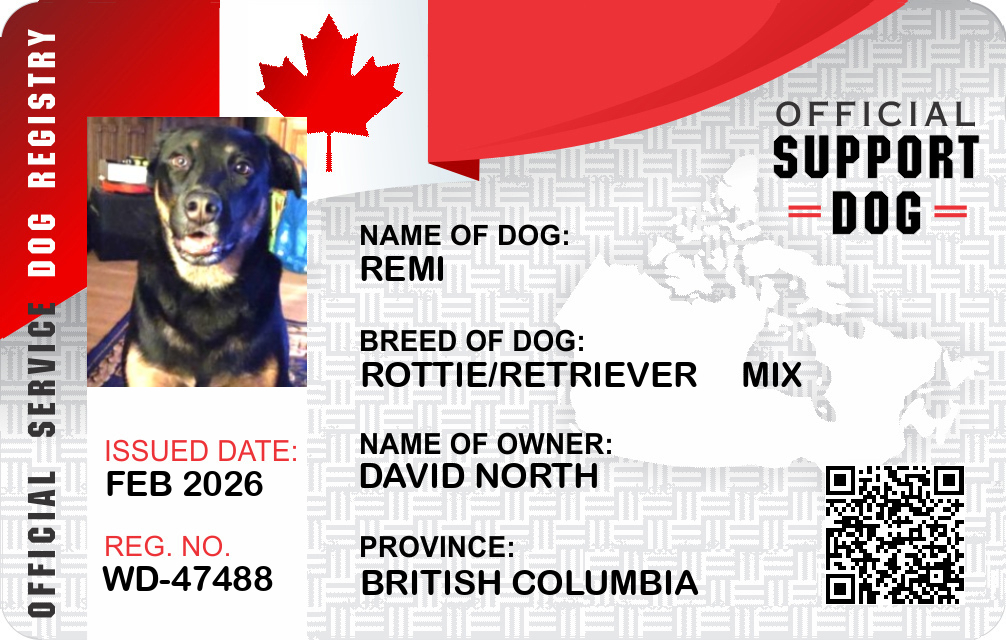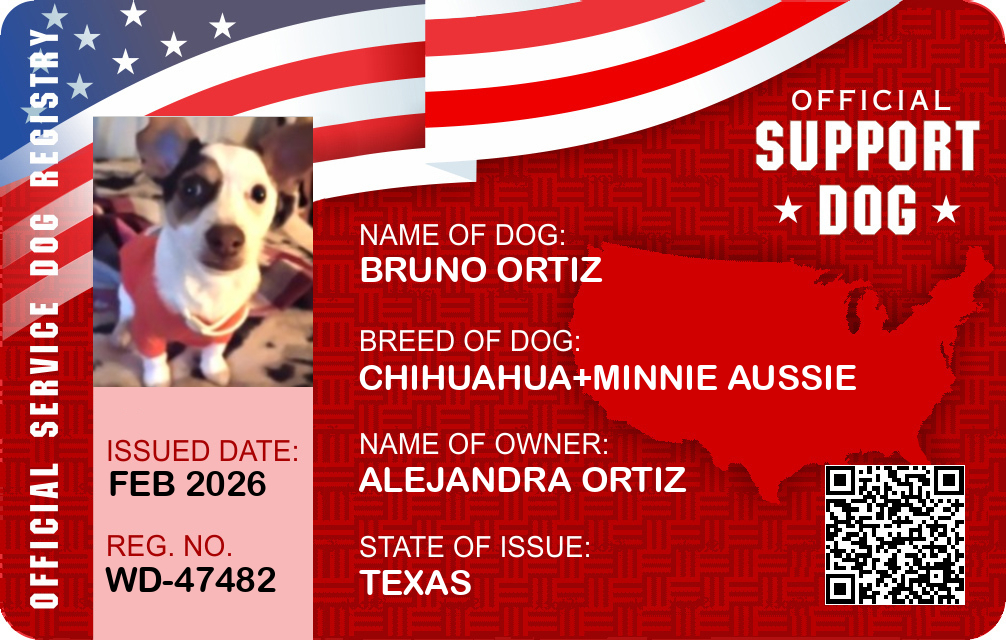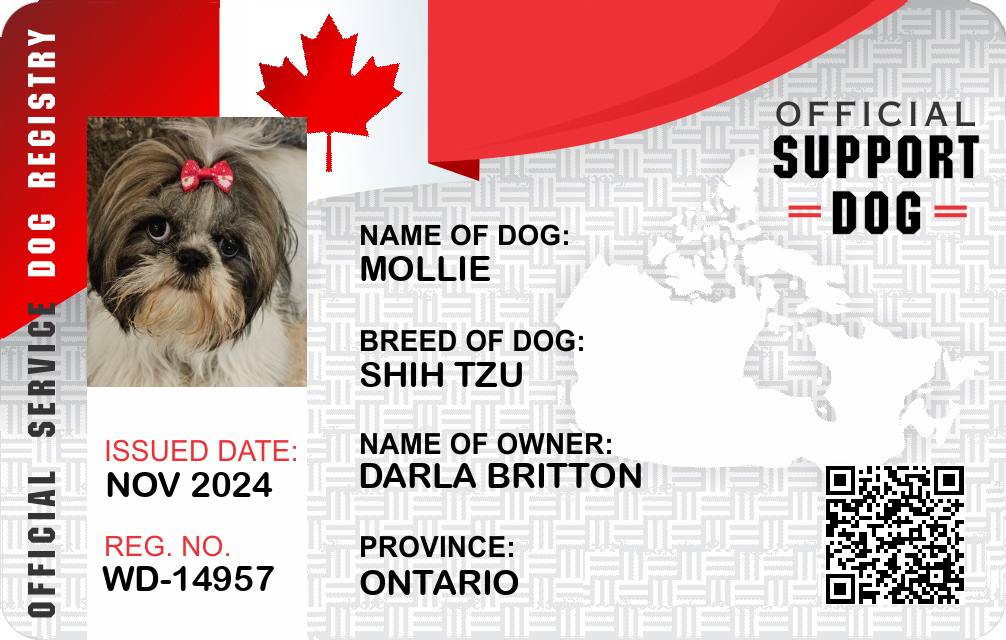Texas Service Dog Laws
Get Your Documents
Example State Cards

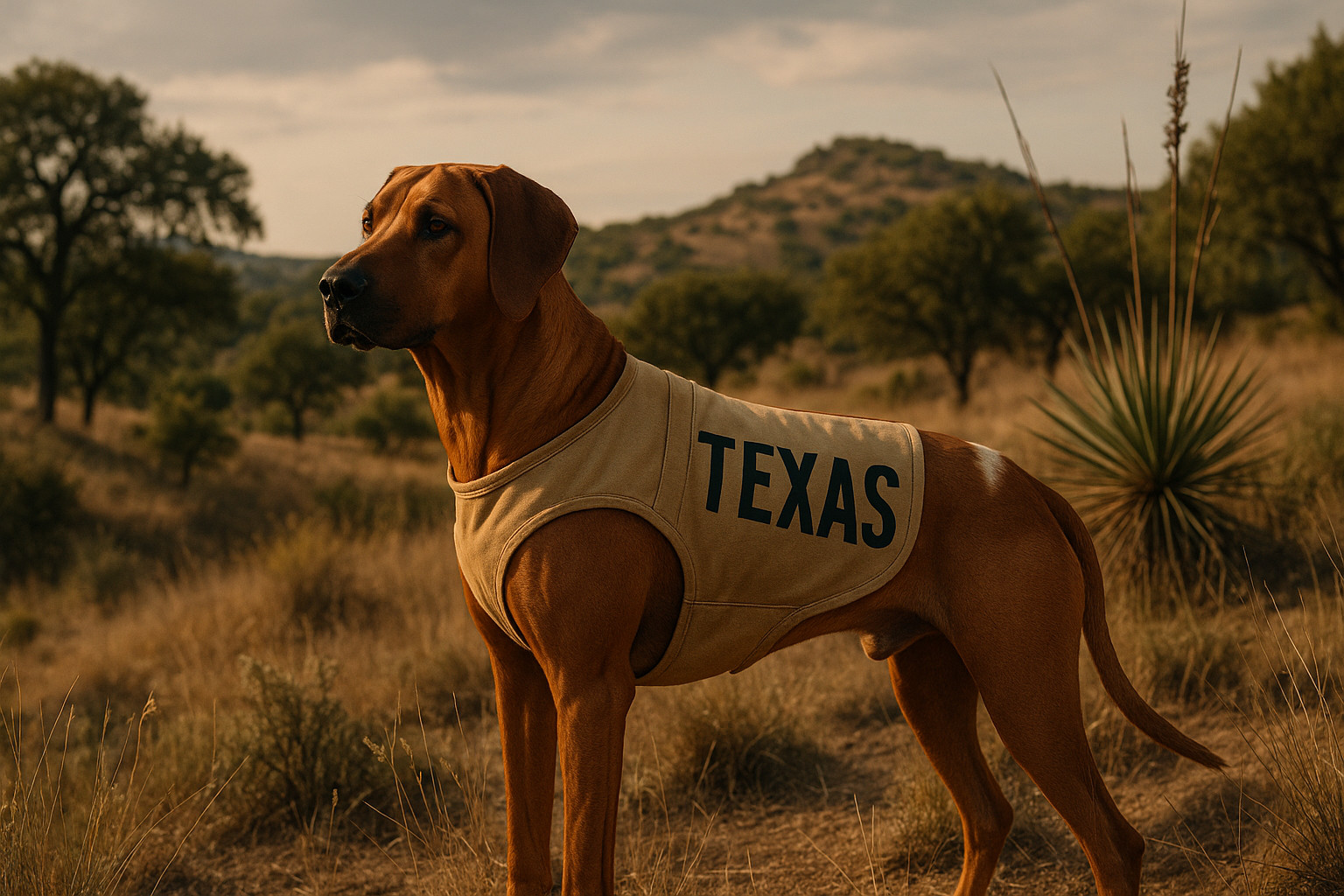
Overview of Service Dog and Legal Definitions in Texas
What is a Service Dog?
In Texas, a service dog is defined as a dog that is individually trained to perform tasks for the benefit of an individual with a disability, including a physical, sensory, psychiatric, or intellectual disability. The primary function of a service dog is to mitigate the effects of a disability by performing specific tasks—such as guiding a person who is blind, alerting a person who is deaf, pulling a wheelchair, or retrieving dropped items. It’s important to understand that “service animal” in the context of Texas law specifically refers to dogs and does not encompass other animals, with the exception of miniature horses, as addressed under certain conditions by the Americans with Disabilities Act (ADA).
How Service Dogs Differ from Other Types of Assistance Animals
Service dogs differ from other types of assistance animals such as emotional support animals (ESA) or therapy animals in their training and the functions they perform. While an ESA provides comfort through companionship and may help alleviate symptoms of certain mental illnesses, they do not perform specific tasks to assist with a disability. Therapy animals are often used in settings such as hospitals and nursing homes to provide therapeutic benefits but do not have the same access rights as service dogs. Unlike service dogs, ESA and therapy animals are not granted general public access rights under federal law.
Key Federal Laws Affecting Service Dogs (e.g., ADA, FHA, ACAA)
Several federal laws intersect with the rights and responsibilities associated with service dogs:
- Americans with Disabilities Act (ADA): This federal law requires places of public accommodation to allow people with disabilities to bring their service animals into all areas where members of the public are allowed. This applies to hospitals, malls, schools, restaurants, and more.
- Fair Housing Act (FHA): This law mandates that housing providers make reasonable accommodations for individuals with disabilities, including permitting the presence of service dogs, regardless of pet policies.
- Air Carrier Access Act (ACAA): The ACAA requires airlines to accommodate passengers with disabilities who travel with service animals. Recent changes have defined service animals specifically as dogs trained to perform tasks for individuals with disabilities, aligning more closely with the ADA.
State-Specific Service Dog Laws in Texas
Housing Rights and Responsibilities
Under the FHA and the Texas Fair Housing Act, individuals with disabilities who require service dogs are entitled to reasonable accommodations in housing. This means that landlords must permit service dogs even if a property has a “no pets” policy. Furthermore, landlords cannot charge a pet fee or security deposit for a service dog. If an individual is seeking accommodation for a service dog, landlords are allowed to request documentation demonstrating the need for the animal; however, they cannot demand specifics about the individual’s disability.
Public Access and Accommodation
In Texas, public spaces and accommodations are required to allow access to individuals with service dogs. This includes shopping centers, hotels, medical facilities, and public transportation. Access rights under Texas law align closely with federal ADA requirements, ensuring that businesses cannot impose fees for the entry of service dogs. Businesses can, however, ask two specific questions if the purpose of the dog’s presence is not apparent: whether the dog is required because of a disability and what work or task the dog has been trained to perform.
Transportation and Travel Rules
For transportation, service dogs are permitted on all public transit systems, including buses and trains in Texas. The ACAA ensures that airlines must also accommodate service dogs, though recent changes mean that only dogs are considered service animals, and advance notice and documentation can be requested by airlines. Service dog handlers must ensure their animals are harnessed, leashed, or tethered unless such devices interfere with the dog’s work or the individual’s disability prevents using these devices, in which case the handler must maintain control through voice, signal, or other effective controls.
Employment and Workplace Considerations
Employers in Texas are required by the ADA to make reasonable accommodations for employees with service dogs. This means that a qualified individual with a disability must be allowed to have their service dog at work, provided that it does not cause undue hardship on the operation of the business. Employers may request medical documentation to verify the disability and the necessity of the service dog for workplace accommodations.
Documentation, Requirements, and Processes in Texas
Service Dog Documentation and Who Can Issue It
While Texas law, in concert with federal regulations, does not require specific certification or documentation for service dogs, it is beneficial for handlers to have relevant documentation proving the individual’s need for the service dog to facilitate housing, travel, and employment processes. Such documentation is typically issued by healthcare professionals familiar with the handler’s disability and should demonstrate the necessity for a service dog without disclosing specific medical details.
Landlord, Business, and Provider Verification Rules
Landlords and business owners in Texas may request certain verifications under specific conditions. In housing, they can seek documentation to establish a verified need for the animal, but should not ask for specific medical records. In public spaces, as noted, they can only inquire about the need for the animal and the tasks it performs. Airlines may require notification and documentation under the ACAA but must provide equal service to passengers with disabilities without imposing undue barriers.
Rights, Limitations, and Legal Risks
Rights Service Dog Handlers Have in Texas
Handlers of service dogs in Texas enjoy protections allowing access to public accommodations, housing, and public transport systems. They cannot be charged additional fees due to their service dog or be denied access outright due to the presence of their animal. Employers must accommodate workers with service dogs unless exemptions due to undue hardship can be substantiated.
Limits on Service Dog Protections and Common Restrictions
While service dogs generally have broad access, there are limitations. For example, if a service dog is out of control and the handler does not take action to control it, or if the dog is not housebroken, the facility can request that the animal be removed. Moreover, the handler does not have the right to access private areas not open to the general public.
Penalties for Fraud or Misrepresentation
Texas law provides penalties for individuals who misrepresent their pet as a service animal. Such misrepresentation could lead to fines and a misdemeanor charge. Misrepresentation undermines the credibility of legitimate service dogs and can disrupt the systems intended to support individuals with disabilities.
Practical Guidance for Service Dog Handlers in Texas
How to Qualify for a Service Dog Legitimately
To qualify for a service dog, individuals must have a disability as defined by the ADA and the dog must be trained to perform tasks directly related to that disability. Steps generally include obtaining documentation of the disability from a licensed healthcare provider and demonstrating a need for specific assistance from a service dog.
How to Talk to Landlords, Airlines, and Employers
When discussing service dog needs with landlords, airlines, or employers, it is advisable to:
- Clearly communicate the necessity of the service dog due to the disability.
- Provide appropriate documentation without disclosing sensitive health details.
- Reference relevant laws, such as the ADA, FHA, or ACAA, when necessary to clarify rights and responsibilities.
Summary of Service Dog Laws in Texas
**- Service dogs are defined by their training to perform tasks for individuals with disabilities.
- Federal laws such as the ADA, FHA, and ACAA provide foundational rights for handlers.
- Texas aligns with these federal mandates in public access, housing, and employment.
- Misrepresentation of pets as service dogs is a prosecutable offense.
- Landlords and employers may require documentation of need without intrusive information.
- Service dogs must be under control and well behaved to maintain access privileges.**
These guidelines ensure that handlers and the public are informed about the rights and limitations of service dog access in Texas, fostering mutual understanding and cooperation.
Get Your Documents
Example State Cards





